Business in Costa Rica, San Jose

Costa Rican Economy and Foreign Trade. Services sector, manufacturing
- Introduction to Costa Rica (Central America)
- Business in San Jose
- Costa Rican Economy
- International Trade of Costa Rica
- Investment in Costa Rica
- Business Opportunities in Costa Rica
- Services sector
- Advanced Manufacturing
- Medical Devices
- Case Study
- Multinational Companies in Costa Rica
- Intel Costa Rica
- Cafe Britt
- Access to the Costa Rican Market
- Business Plan for Costa Rica
The objectives of the subject “International Trade and Business in Costa Rica” are the following:
- To analyze the Costa Rican Economy and Global Trade
- To know the trade opportunities in Costa Rica
- To explore the Costa Rican trade relations with the country of the student
- To know the Costa Rican Trade Agreements
- To examine the profile of Costa Rican Companies
- To develop a business plan for the Costa Rican Market

The Subject “Foreign Trade and Business in Costa Rica” belongs to the following Online Programs taught by EENI Global Business School:
Masters: International Business, Foreign Trade.
Languages:  or
or  Costa Rica
Costa Rica  Costa Rica.
Costa Rica.
- Credits of the subject “Doing Business in Costa Rica”: 1

- Duration: one week
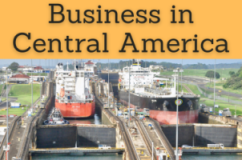
International Trade and Business in Costa Rica.

- Costa Rica and the Latin American Economic Area
- Association of Caribbean States
- Central American Integration System
- Central American Common Market - Integrated with the SICA -
- Mesoamerica Project
- Latin American and Caribbean Economic System
- Costa Rica has Trade Agreements with Panama, Colombia, Chile, EU, EFTA
- Mexico-Costa Rica Agreement
- CARICOM-Costa Rica Agreement
- UK-Central America Free Trade and Economic Integration Agreement
- Costa Rica-Singapore Agreement
- Dominican Republic-Central America-U.S. Agreement
- Dominican Republic-Central America Agreement
- China-Costa Rica Agreement
- Mexico-Central America Agreement
- Panama-Costa Rica Agreement
- South Korea-Central America Agreement
- Costa Rica-Peru Agreement
- Canada-Costa Rica Agreement
- ALADI (observer)
- Pacific Alliance (candidate country)

- WTO
- GATS
- Agreement on the Application of Sanitary Measures
- Agreement on Technical Barriers to Trade
- Agreement on Preshipment Inspection
- Agreement on Safeguards
- Trade Facilitation Agreement
- WCO
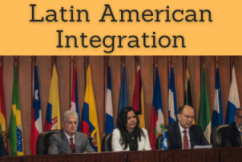
- OAS
- Inter-American Development Bank
- ECLAC
- East Asia-Latin America Cooperation
- CELAC

- UN
- WB
- WTO
- IMF
- OECD (Accession Candidate)
- Borders of Costa Rica: Nicaragua, Colombia, and Panama
- Costa Rican population: 4.9 million people
- Area of Costa Rica: 51,100 km²
- Capital of Costa Rica: San José
- Official language: Spanish
- Costa Rica is the most politically stable country in Latin America (WB)
- Costa Rica is one of the oldest American democracies
- Costa Rica has no army
- Costa Rica gained the independence from Spain in 1821
- Abolition of Slavery in Costa Rica: 1824
- African Diaspora in Costa Rica: 0.1 million people (3% of the Costa Rican population)
Religion in Costa Rica: Christianity (Catholicism: 3 million).

Costa Rica belongs to the Western Civilization - Latin American Economic Area.
Main cities in Costa Rica.
- San Jose (Costa Rican capital) is the Latin American fourth-largest city with better quality of life (The Economist)
- Heredia: Global Park Free zone, Sykes, IBM, Hospira, Boston Scientific, Baxter America Services
- Alajuela ranks first in Costa Rica in coffee and sugar cane production
- Puerto Limon is the largest port in Costa Rica
Costa Rican Economy.
- Costa Rica (America) has positioned itself as a key destination for operations of multinational companies in a variety of industries: advanced manufacturing, medical devices, and services
- 200 global companies have chosen Costa Rica as an establishment location
- Costa Rica has a strong legal system that administers the Judicial Power, which guarantees the law accordance and covers nationals, as well as foreigners within Costa Rica
- The World Bank Study for Global Governance Indicators ranks Costa Rica in the first place within Latin America for political stability
- The real GDP has been increasing at a compound annual growth rate of 5.3% since 1991
- Costa Rica is one of the most competitive destinations in Latin America for service operations
- Costa Rica is one of the most competitive locations, above the largest economies in Latin America (Brazil, Mexico, and Chile)
- Total foreign direct investment inflows have grown an average 22% every year since 2000
- Foreign direct investment per capita = 448 USD
- GDP per capita of Costa Rica is seven times higher than China
- Costa Rica has become an important location for companies from the U.S., as well as a strategic offshore location for the European enterprises in the dollar zone, for the European-based companies
- Services sector has been growing in the last decade, from one company in 1995, to ninety-five companies and 28,416 employees
- Currency of Costa Rica: Costa Rica Colon
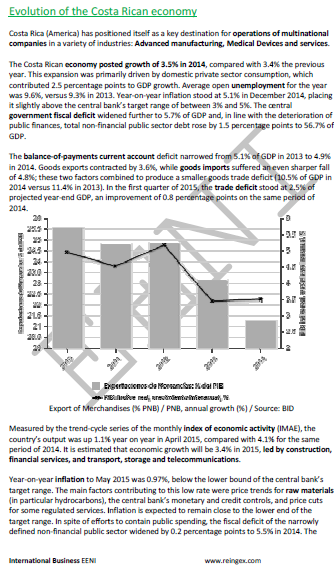
Companies in Costa Rica.
Intel in Costa Rica. Costa Rica is home to Intel's only production site in Latin America. The local factory is focused on the assembly and testing of microprocessors and chipsets, product development, and customer support. Intel Costa Rica is also an international distribution centre and a strong back-office organizational function supporting several business groups including Finance, Materials, Planning, information technology, and Employee Services. Intel is placed in Heredia (San José). The facilities in La Ribera occupy 126 acres and include one manufacturing factory and one distribution centre dedicated to the assembly, testing, and distribution in the World's fastest processors.
Business in Costa Rica
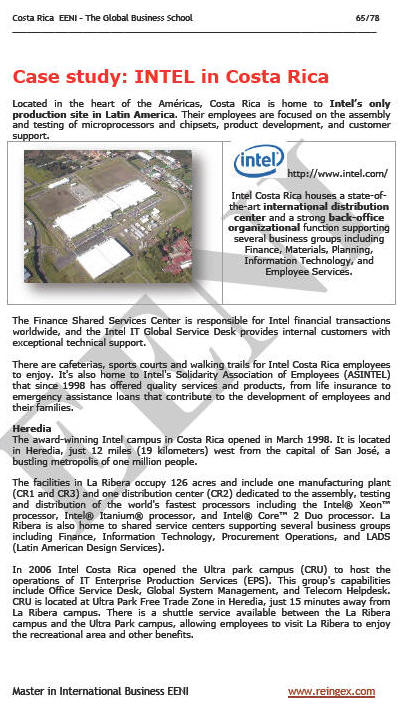
Since the mid-1990's Café Britt thought the International Airport in Costa Rica as a place where the traveler must find their products. Britt decided to expand internationally. The company decided to pursue international markets actively and invested in Peru, Curaçao, the Netherlands Antilles, Chile, Miami, St. Thomas, Antigua and Barbuda, and Mexico.

International Trade of Costa Rica.
- Costa Rica is the fourth high-tech exporter in the World
- One of the pillars of the Costa Rican economic development has been the international trade liberalization, which has allowed exports to surpass its 30% ratio of the GDP in 1980 to a 50% rate (includes product and service exports)
- This foreign trade liberalization has been followed by a series of structural modifications resulting in productivity growth, economy diversification and a higher level of investment
- All these modifications have translated into important social achievements. In the last twenty years poverty was reduced from 40% to less than 20%
- Costa Rican Exports: 8.847 billion dollars
- Main Costa Rican export products: integrated circuits, medical equipment, bananas, pineapples, coffee, melons, ornamental plants, sugar, textiles, electronic components, and medical equipment
- Largest export markets of Costa Rica: the U.S. 23.9%, the Netherlands 13.3%, China 12.9%, the UK 5%, and Mexico 4.9%
- Costa Rican Imports: 10.87 billion dollars
- Top import products of Costa Rica are raw materials, consumer products, capital equipment, and petroleum
- Largest Costa Rican international suppliers: the U.S. 42.7%, Mexico 6.9%, Venezuela 6.3%, Japan 5.4%, China 4.7%, and Brazil 4.2%
Sample: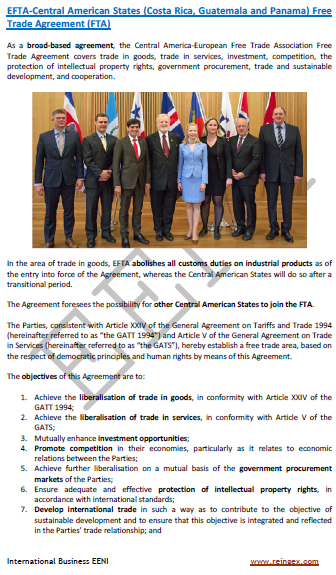
(c) EENI Global Business School (1995-2024)
We do not use cookies
Top of this page



